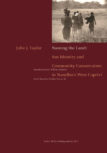Naming the Land. San Identity and Community Conservation in Namibia’s West Caprivi
- Language: English
- 280 pages
- Illustrations, tables, maps, index
- Vol. 12, 2012
- ISSN: 2234-9561
- ISBN:
- Print: 978-3-905758-25-2
- PDF: 978-3-905758-53-5
Naming the Land. San Identity and Community Conservation in Namibia’s West Caprivi
This book encompasses a history of identity-building amongst Khwe San people, and of contestations for authority over land and natural resources in Namibia’s West Caprivi. The politics of authority in this contested borderland area were significantly shaped by state and NGO interventions into local institutions and land use between the late 1930s and 2006. Julie J. Taylor pays close attention to the role of NGOs in these processes. She shows that, in their relationship with West Caprivi’s residents, NGOs unintentionally contributed towards the hardening and politicising of ethnic difference, including through the implementation of land mapping projects. At the same time, in their relationship with the state, NGOs often worked to ‘depoliticise’ struggles over authority, thus inadvertently reinforcing the state’s authority in the area.
Julie J. Taylor obtained her doctorate from the University of Oxford for this study. She holds an MPhil in Development Studies, also from Oxford, and a BA (Hons) in Social Anthropology from the University of Cambridge. Her research on history, politics, identity and the environment in West Caprivi has been published in Journal of African History, African Studies, Geoforum, Cultural Survival Quarterly and Anthropology Today, amongst others.
The Fortunes and Fragility of Community Conservation: An Introduction by William Beinart
1 Introduction and Methodology
2 Identity, Authority and CBNRM Part IV: Gender & Colonial Law
3 Differentiating ‘Bushmen’ from ‘Bantus’: Identity in West Caprivi, 1930–1989
4 The Politics of Land, Leadership and Identity 1990–2006
5 Chiefs, Chairmen and the Politics of CBNRM, 1995–2006
6 CBNRM meets Countermapping: Khwe-NGO Mapping, 1998–2006
Conclusion: San, NGOs and the State
“Julie Taylor has written an extraordinary book about a distinctive part of southern Africa – a tongue of land between Angola and Botswana, straddling the watershed and floodplains of the Zambezi … an area on the political and economic margins of the subcontinent. Yet it has natural riches, not least wildlife. … This recent history of the Khwe, combining disciplines and extensive fieldwork, provides a wonderful window on the new struggles over land and nature.”
William Beinart, University of Oxford
“Naming the Land questions the essentializing undertonesin most studies of “the San” (as exemplified by the studies of the Harvard Kalahari Group) and explicitly places itself in the revisionist tradition started by Denbow and Wilmsen – but then, paraphrasing the author, with actors. The book obviously builds on Ferguson’s analysis of the latent functions of development in the anti-politics machine, and offers an excellent contribution to the debate on the political ecology of southern Africa. It is a fine example of contemporary, exciting research in Namibia, and is in tune with the high standards the publisher, Basler Afrika Bibliographien, sets for its publications. Apart from this, it may prove to be very useful in the classroom for its analysis of, for instance, the local use of a “global” technology (i.e., Geographic Information Systems, GIS) in the chapter on mapping.“
Steven Van Wolputte

